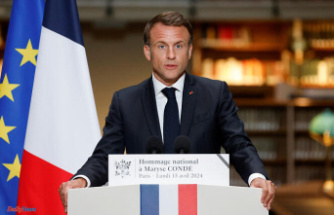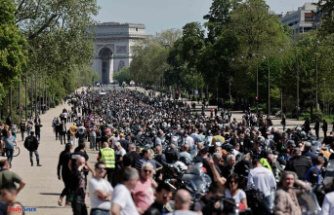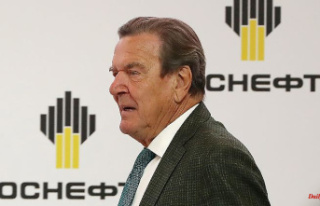Jens Spahn has written a book. He has turbulent times behind him: from health minister and secret favorite for the chancellor candidacy to the opposition bench. In an interview with ntv.de, the deputy faction leader explains how he deals with failure, why Germany has to prove itself again and why discussions on the platform are so important.
ntv.de: Anyone who sees today how Robert Habeck was the focus of attention as Economics Minister from the first day of the war can draw parallels to your position in the first year of the Corona crisis. He reacted quickly, pragmatically and shot to the top in the polls. You were perceived and supported in a very similar way until about the vaccination campaign, when the criticism became very harsh. Will the gas levy now be Habeck's vaccination campaign?
Jens Spahn: Well, first of all: every comparison is also flawed.
Clear.
But there are a few parallels, I sometimes think. The Infection Protection Act was the law that was central to the pandemic and that we often changed. Now the Energy Security Act is - if you will - the Infection Protection Act of the energy crisis. The Federal Network Agency is the Robert Koch Institute of the energy crisis. The principle that I also describe in my book, "speed trumps perfection", i.e. speed is more important than perfection, I find again in both crises.
Only the CDU can be found in a completely different role.
In fact, the crazy thing is that I am now in the opposition and through my job as parliamentary group deputy for energy and economy, accompanying this crisis politically from the other side. It is important for me: I will not criticize Robert Habeck or the government for acting quickly and having to correct or adjust something. Or that an energy security law will be changed, I believe soon for the fourth time. I won't criticize that, because we have learned from the government in times of crisis that constant adjustment is necessary. Criticism then tends to come up with the question: What obviously had to be done six months ago - and hasn't happened to this day? In this respect, this - limping - comparable and this experience in the crisis is something that shapes my opposition work.
Would you have acted differently without the Corona experience?
I don't know how it would be. But in any case, especially in crises, we also have to discuss, also controversially, that's what I promote in my book. It is precisely on such existential questions that we have to argue. We had to, both with the massive intrusions into freedom during the pandemic, and now with what this war and this energy crisis means for the country. There are very different positions. But the key is to be merciful about it. It's about naming a mistake as such, but not getting personal and not absolute. Not to harden.
It is often said that in order to get the population involved in a crisis and when making tough decisions, politicians have to "explain themselves" well.
Talking is important. But just listening is just as important, that's my experience with Corona. By the way, that still applies today. I sometimes sit on the train or wait at the station, and then people, often parents, come and just want to get rid of what has been bothering them so much. And there, in my experience, you don't have to start with a huge explanation, just that it's spoken out to someone who had or has political responsibility, that makes a difference. So talking and listening is the only recipe for staying together even under stress.
Have you ever asked for forgiveness in a situation like this?
You mean at the train station?
Could also be in the pool.
So not explicitly, yes indirectly. Is "I'm sorry" or "I see your point", "I understand you" already asking for forgiveness? Not quite yet, right?
Hmm.
So in a situation like that, specifically not, no. But that's what I experience most with parents, the feeling of not having been seen. Our focus was on the elderly, the most vulnerable, on keeping the economy stable. But what it did to a family, especially to the children and young people, being so closely thrown together wasn't enough in sight. And that's also the point in the book where I say we have to ask for forgiveness. I as well.
The phase when so many countries tried to empty the international market for protective masks was referred to as the Wild West. At that time, export bans were imposed and the borders to the neighbors were closed. Do you experience international relations differently in the current crisis?
Here, too, the comparisons are limping, but they exist: we buy gas at any price in the world. We also bought masks at almost any price in the world for a while. The time was significantly shorter, but it was a phase of greatest need, the price was important but not decisive. It's the same with gas now. In my opinion, the European coordination works better. But the truth is also: the emergency has not yet materialized. I wonder: What will happen when gas really becomes scarce? Will the Dutch then continue to let the gas from Rotterdam flow to us? Do we continue to let the gas from our storage facilities, which does not only belong to us, go to France or Poland? Will they still supply us with electricity? To put it bluntly: does the French gasworks stop operating so that German pensioners don't freeze? That remains to be clarified.
During the pandemic, one senior healthcare official found that you never slept and were always eight hours ahead of the others in the mornings.
I have a healthy sleep and I think that's important. But of course there was a time when there was 24-hour continuous operation. Especially during the first two lockdowns, I drove through Berlin to the ministry in the morning, we rotated constantly in the ministry, didn’t meet anyone personally, only had to change gear, I drove back in the evening and the whole city was completely empty. I didn't think about time at all.
When you then have to make such far-reaching decisions, it is certainly very stressful. But when they worked, you sometimes thought: "I can fly?"
The German federal system alone protects you from that, because there are always many people who have a say. And that's also good in such phases, that nobody thinks of simply governing. After all, these were the strongest restrictions on freedom in the history of the Federal Republic. At the same time, the experience of making a difference with a decision is particularly pronounced in the pandemic because sometimes you buy or don't buy masks within minutes, hours. Order vaccine or not - and if so, how much?
How difficult is it now to watch others make far-reaching decisions?
Do you mean "difficult" in the sense of "I'd like to sit there now too"?
That's what I meant, but you can also decline different kinds of "difficult" through.
If you actively participate in decision-making and change things for many years - I was also a state secretary and spokesman before that - and then there is one day when you leave the ministry, and from then on you can primarily criticize and write motions, but not decide a lot more - you have to relocate in your head. That worked, but took a while.
If you - still in the middle of the crisis - are punished by your own party in the election for the Vice-CDU presidency with the narrowest result, is that more bitter than being criticized at the train station?
I've been here for a long time, I've experienced a lot. So I knew and I know that gratitude is not a category in the political business. That's the way it is, I'm fine with that. In this respect, I know the ups and downs of party life. If you lose an election so badly, then a major reorganization into party and faction begins. And it's not like everyone was waiting for the ex-ministers. I checked myself first: Am I still passionate about politics? And can I still make a difference? You can only make a difference if you have a position - like now as deputy group leader. And I really had to fight to stay on the field.
The other day at the CDU party conference, the attitude of the 1000 delegates, in my opinion, oscillated between the thoroughly self-critical desire for renewal of Friedrich Merz and the relaxed self-satisfaction of Markus Söder. What do you recommend to your party?
After 16 years of government, I can only recommend that we manage the balancing act between "We stand by our successful years of government" and at the same time clearly see that these 16 years could not simply have been extended. Much of what was taken for granted back then - the Americans are watching over our security, Russian energy is cheap, and the whole world wants free trade and is buying our products - that was already under stress during the pandemic. And that's what it's all about now. And with it the Federal Republic's business model. But for us as a party, if we do it right, it's also an opportunity. Without breaking with the 16 years, at the same time renewing our program as a party and also including the country in this mood. That will be sorely needed.
How can that be done?
We have to underpin the desire for innovations, ideas, the claim to play a role in the world, even with difficult decisions. We haven't had to do that for a long time. There is a generation of MEPs from all parliamentary groups - and I don't mean that in a reproachful way, they were good years - who up until now have never really had to make any real savings or cutback decisions. For us as a party, the mix is now right - in everything that is to be criticized - to be a piece at peace with the 16 years and at the same time to make a cut into the future after these two crises.
Because you just mentioned the Federal Republic model: My understanding of the Federal Republic has always included that we have the situation under control, no matter what happens. That was not the case during the pandemic, during the flood in the Ahr valley, and is clearly not the case now in the energy crisis. Did I fall for an illusion?
What I'm thinking these days when it comes to planning and approval procedures: We have incredibly high security requirements in everyday life, everything has some kind of signal, a note, a sticker, a rule, a formal check. But for the real crisis, when it comes down to it: How can you react in the acute emergency? How agile, how flexible are you? What resources do you have? We're not nearly good enough there, there's a lack of structures and processes. The federal government was often not even formally responsible during the pandemic. The Ministry of Health was a house in which above all laws and regulations were written. Operational implementation took place at other levels. There had never been a need to negotiate with pharmaceutical companies or test providers in this way. But there was no one else in the union who would have ever done that. And then we shot that in the ministry, from legislation to operational action. And everyone went along.
In operational terms, we must therefore eliminate our deficits.
It's like that, when the crisis is there, when it's burning, then the human brain contracts - there's a lot of research on that, but now I'm going astray - it concentrates on the concrete, precarious situation and wants to get out - and you then no longer consider all the possibilities and options comprehensively. That's why you do the routine exercises, to know exactly which way is best when it burns. We haven't done such exercises for too many situations in life for too long. By the way, not for the case of defense either. It would be good if we learned this lesson from the pandemic and didn't just keep it for two years, that's not art. But if we stay prepared and keep practicing crises, even after nothing has happened for 15 or 20 years.
Frauke Niemeyer spoke to Jens Spahn












